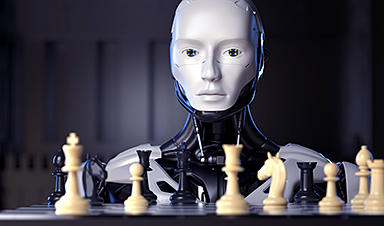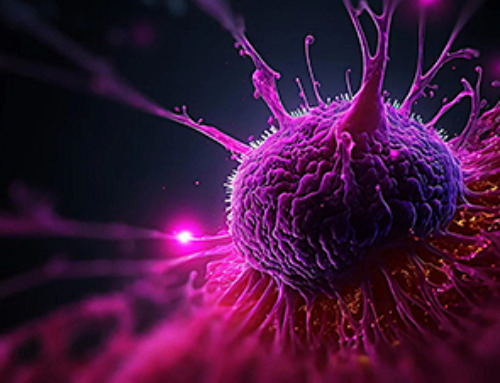A new artificial intelligence (AI) model has just achieved human-level results on a test designed to measure “general intelligence.”
On December 20, OpenAI’s o3 system scored 85% on the ARC-AGI benchmark, well above the previous AI best score of 55% and on par with the average human score. It also scored well on a very difficult mathematics test.
Creating artificial general intelligence, or AGI, is the stated goal of all the major AI research labs. At first glance, OpenAI appears to have at least made a significant step towards this goal.
While skepticism remains, many AI researchers and developers feel something just changed. For many, the prospect of AGI now seems more real, urgent and closer than anticipated. Are they right?
Generalization and intelligence
To understand what the o3 result means, you need to understand what the ARC-AGI test is all about. In technical terms, it’s a test of an AI system’s “sample efficiency” in adapting to something new—how many examples of a novel situation the system needs to see to figure out how it works.
An AI system like ChatGPT (GPT-4) is not very sample efficient. It was “trained” on millions of examples of human text, constructing probabilistic “rules” about which combinations of words are most likely.
The result is pretty good at common tasks. It is bad at uncommon tasks, because it has less data (fewer samples) about those tasks.
Until AI systems can learn from small numbers of examples and adapt with more sample efficiency, they will only be used for very repetitive jobs and ones where the occasional failure is tolerable.
The ability to accurately solve previously unknown or novel problems from limited samples of data is known as the capacity to generalize. It is widely considered a necessary, even fundamental, element of intelligence.
Grids and patterns
The ARC-AGI benchmark tests for sample efficient adaptation using little grid square problems like the one below. The AI needs to figure out the pattern that turns the grid on the left into the grid on the right.

Each question gives three examples to learn from. The AI system then needs to figure out the rules that “generalize” from the three examples to the fourth.
These are a lot like the IQ tests sometimes you might remember from school.
Weak rules and adaptation
We don’t know exactly how OpenAI has done it, but the results suggest the o3 model is highly adaptable. From just a few examples, it finds rules that can be generalized.
To figure out a pattern, we shouldn’t make any unnecessary assumptions, or be more specific than we really have to be. In theory, if you can identify the “weakest” rules that do what you want, then you have maximized your ability to adapt to new situations.
What do we mean by the weakest rules? The technical definition is complicated, but weaker rules are usually ones that can be described in simpler statements.
In the example above, a plain English expression of the rule might be something like: “Any shape with a protruding line will move to the end of that line and ‘cover up’ any other shapes it overlaps with.”
Searching chains of thought?
While we don’t know how OpenAI achieved this result just yet, it seems unlikely they deliberately optimized the o3 system to find weak rules. However, to succeed at the ARC-AGI tasks, it must be finding them.
We do know that OpenAI started with a general-purpose version of the o3 model (which differs from most other models, because it can spend more time “thinking” about difficult questions) and then trained it specifically for the ARC-AGI test.
French AI researcher Francois Chollet, who designed the benchmark, believes o3 searches through different “chains of thought” describing steps to solve the task. It would then choose the “best” according to some loosely defined rule, or “heuristic.”
This would be “not dissimilar” to how Google’s AlphaGo system searched through different possible sequences of moves to beat the world Go champion.
You can think of these chains of thought like programs that fit the examples. Of course, if it is like the Go-playing AI, then it needs a heuristic, or loose rule, to decide which program is best.
There could be thousands of different seemingly equally valid programs generated. That heuristic could be “choose the weakest” or “choose the simplest.”
However, if it is like AlphaGo then they simply had an AI create a heuristic. This was the process for AlphaGo. Google trained a model to rate different sequences of moves as better or worse than others.
What we still don’t know
The question then is, is this really closer to AGI? If that is how o3 works, then the underlying model might not be much better than previous models.
The concepts the model learns from language might not be any more suitable for generalization than before. Instead, we may just be seeing a more generalizable “chain of thought” found through the extra steps of training a heuristic specialized to this test. The proof, as always, will be in the pudding.
Almost everything about o3 remains unknown. OpenAI has limited disclosure to a few media presentations and early testing to a handful of researchers, laboratories and AI safety institutions.
Truly understanding the potential of o3 will require extensive work, including evaluations, an understanding of the distribution of its capacities, how often it fails and how often it succeeds.
When o3 is finally released, we’ll have a much better idea of whether it is approximately as adaptable as an average human.
If so, it could have a huge, revolutionary, economic impact, ushering in a new era of self-improving accelerated intelligence. We will require new benchmarks for AGI itself and serious consideration of how it ought to be governed.
If not, then this will still be an impressive result. However, everyday life will remain much the same.
News
Deadly Pancreatic Cancer Found To “Wire Itself” Into the Body’s Nerves
A newly discovered link between pancreatic cancer and neural signaling reveals a promising drug target that slows tumor growth by blocking glutamate uptake. Pancreatic cancer is among the most deadly cancers, and scientists are [...]
This Simple Brain Exercise May Protect Against Dementia for 20 Years
A long-running study following thousands of older adults suggests that a relatively brief period of targeted brain training may have effects that last decades. Starting in the late 1990s, close to 3,000 older adults [...]
Scientists Crack a 50-Year Tissue Mystery With Major Cancer Implications
Researchers have resolved a 50-year-old scientific mystery by identifying the molecular mechanism that allows tissues to regenerate after severe damage. The discovery could help guide future treatments aimed at reducing the risk of cancer [...]
This New Blood Test Can Detect Cancer Before Tumors Appear
A new CRISPR-powered light sensor can detect the faintest whispers of cancer in a single drop of blood. Scientists have created an advanced light-based sensor capable of identifying extremely small amounts of cancer biomarkers [...]
Blindness Breakthrough? This Snail Regrows Eyes in 30 Days
A snail that regrows its eyes may hold the genetic clues to restoring human sight. Human eyes are intricate organs that cannot regrow once damaged. Surprisingly, they share key structural features with the eyes [...]
This Is Why the Same Virus Hits People So Differently
Scientists have mapped how genetics and life experiences leave lasting epigenetic marks on immune cells. The discovery helps explain why people respond so differently to the same infections and could lead to more personalized [...]
Rejuvenating neurons restores learning and memory in mice
EPFL scientists report that briefly switching on three “reprogramming” genes in a small set of memory-trace neurons restored memory in aged mice and in mouse models of Alzheimer’s disease to level of healthy young [...]
New book from Nanoappsmedical Inc. – Global Health Care Equivalency
A new book by Frank Boehm, NanoappsMedical Inc. Founder. This groundbreaking volume explores the vision of a Global Health Care Equivalency (GHCE) system powered by artificial intelligence and quantum computing technologies, operating on secure [...]
New Molecule Blocks Deadliest Brain Cancer at Its Genetic Root
Researchers have identified a molecule that disrupts a critical gene in glioblastoma. Scientists at the UVA Comprehensive Cancer Center say they have found a small molecule that can shut down a gene tied to glioblastoma, a [...]
Scientists Finally Solve a 30-Year-Old Cancer Mystery Hidden in Rye Pollen
Nearly 30 years after rye pollen molecules were shown to slow tumor growth in animals, scientists have finally determined their exact three-dimensional structures. Nearly 30 years ago, researchers noticed something surprising in rye pollen: [...]
NanoMedical Brain/Cloud Interface – Explorations and Implications. A new book from Frank Boehm
New book from Frank Boehm, NanoappsMedical Inc Founder: This book explores the future hypothetical possibility that the cerebral cortex of the human brain might be seamlessly, safely, and securely connected with the Cloud via [...]
How lipid nanoparticles carrying vaccines release their cargo
A study from FAU has shown that lipid nanoparticles restructure their membrane significantly after being absorbed into a cell and ending up in an acidic environment. Vaccines and other medicines are often packed in [...]
New book from NanoappsMedical Inc – Molecular Manufacturing: The Future of Nanomedicine
This book explores the revolutionary potential of atomically precise manufacturing technologies to transform global healthcare, as well as practically every other sector across society. This forward-thinking volume examines how envisaged Factory@Home systems might enable the cost-effective [...]
A Virus Designed in the Lab Could Help Defeat Antibiotic Resistance
Scientists can now design bacteria-killing viruses from DNA, opening a faster path to fighting superbugs. Bacteriophages have been used as treatments for bacterial infections for more than a century. Interest in these viruses is rising [...]
Sleep Deprivation Triggers a Strange Brain Cleanup
When you don’t sleep enough, your brain may clean itself at the exact moment you need it to think. Most people recognize the sensation. After a night of inadequate sleep, staying focused becomes harder [...]
Lab-grown corticospinal neurons offer new models for ALS and spinal injuries
Researchers have developed a way to grow a highly specialized subset of brain nerve cells that are involved in motor neuron disease and damaged in spinal injuries. Their study, published today in eLife as the final [...]





















